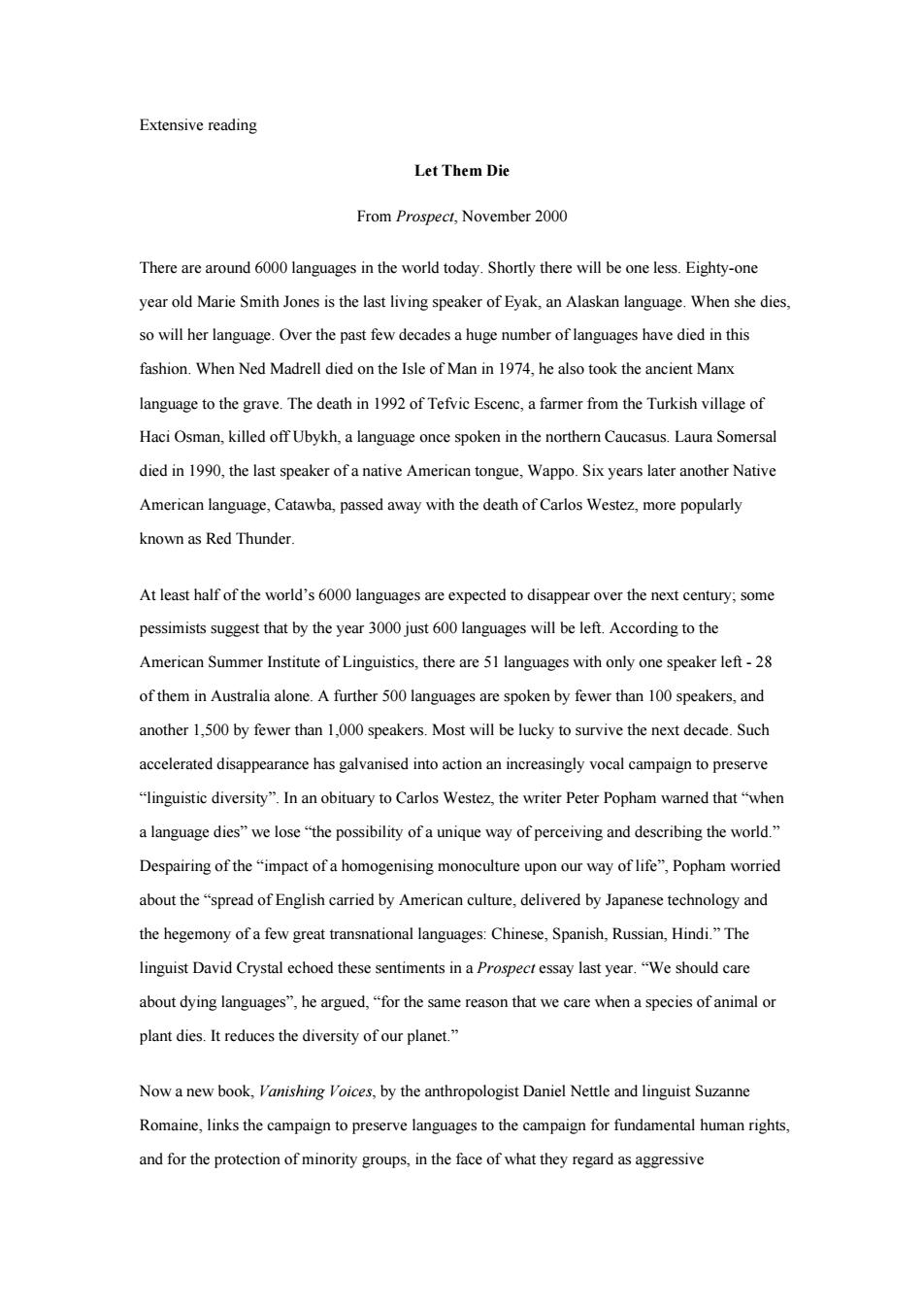正在加载图片...

Extensive reading Let Them Die From Prospect,November 2000 There are around 6000 languages in the world today.Shortly there will be one less.Eighty-one year old Marie Smith Jones is the last living speaker of Eyak,an Alaskan language.When she dies, so will her language.Over the past few decades a huge number of languages have died in this fashion.When Ned Madrell died on the Isle of Man in 1974.he also took the ancient Manx language to the grave.The death in 1992 of Tefvic Escenc,a farmer from the Turkish village of Haci Osman,killed off Ubykh,a language once spoken in the northern Caucasus.Laura Somersal died in 1990,the last speaker of a native American tongue,Wappo.Six years later another Native American language,Catawba,passed away with the death of Carlos Westez,more popularly known as Red Thunder. At least half of the world's 6000 languages are expected to disappear over the next century;some pessimists suggest that by the year 3000 just 600 languages will be left.According to the American Summer Institute of Linguistics,there are 51 languages with only one speaker left-28 of them in Australia alone.A further 500 languages are spoken by fewer than 100 speakers,and another 1,500 by fewer than 1,000 speakers.Most will be lucky to survive the next decade.Such accelerated disappearance has galvanised into action an increasingly vocal campaign to preserve "linguistic diversity".In an obituary to Carlos Westez,the writer Peter Popham warned that"when a language dies"we lose"the possibility of a unique way of perceiving and describing the world." Despairing of the "impact of a homogenising monoculture upon our way of life",Popham worried about the"spread of English carried by American culture,delivered by Japanese technology and the hegemony of a few great transnational languages:Chinese,Spanish,Russian,Hindi."The linguist David Crystal echoed these sentiments in a Prospect essay last year."We should care about dying languages",he argued,"for the same reason that we care when a species of animal or plant dies.It reduces the diversity of our planet." Now a new book,Vanishing Voices,by the anthropologist Daniel Nettle and linguist Suzanne Romaine,links the campaign to preserve languages to the campaign for fundamental human rights, and for the protection of minority groups,in the face of what they regard as aggressiveExtensive reading Let Them Die From Prospect, November 2000 There are around 6000 languages in the world today. Shortly there will be one less. Eighty-one year old Marie Smith Jones is the last living speaker of Eyak, an Alaskan language. When she dies, so will her language. Over the past few decades a huge number of languages have died in this fashion. When Ned Madrell died on the Isle of Man in 1974, he also took the ancient Manx language to the grave. The death in 1992 of Tefvic Escenc, a farmer from the Turkish village of Haci Osman, killed off Ubykh, a language once spoken in the northern Caucasus. Laura Somersal died in 1990, the last speaker of a native American tongue, Wappo. Six years later another Native American language, Catawba, passed away with the death of Carlos Westez, more popularly known as Red Thunder. At least half of the world’s 6000 languages are expected to disappear over the next century; some pessimists suggest that by the year 3000 just 600 languages will be left. According to the American Summer Institute of Linguistics, there are 51 languages with only one speaker left - 28 of them in Australia alone. A further 500 languages are spoken by fewer than 100 speakers, and another 1,500 by fewer than 1,000 speakers. Most will be lucky to survive the next decade. Such accelerated disappearance has galvanised into action an increasingly vocal campaign to preserve “linguistic diversity”. In an obituary to Carlos Westez, the writer Peter Popham warned that “when a language dies” we lose “the possibility of a unique way of perceiving and describing the world.” Despairing of the “impact of a homogenising monoculture upon our way of life”, Popham worried about the “spread of English carried by American culture, delivered by Japanese technology and the hegemony of a few great transnational languages: Chinese, Spanish, Russian, Hindi.” The linguist David Crystal echoed these sentiments in a Prospect essay last year. “We should care about dying languages”, he argued, “for the same reason that we care when a species of animal or plant dies. It reduces the diversity of our planet.” Now a new book, Vanishing Voices, by the anthropologist Daniel Nettle and linguist Suzanne Romaine, links the campaign to preserve languages to the campaign for fundamental human rights, and for the protection of minority groups, in the face of what they regard as aggressive